 Bharat
Yatra
Bharat
Yatra 

This 19th century Indo-Gothic rockpile is one of India's busiest railway stations, Bombay's Victoria Terminus, usually called "VT" by acronym-loving Indians, though it's been officially re-named Chattrapati Shivaji Terminus. What's wrong with this picture? Answer: The traffic signal is working and the cars are stopped at the red light to let the pedestrians cross. You never see that anywhere in India, except perhaps in Bombay. Phones, electricity, public transit, etc. actually do function in Bombay, and you have a reasonable chance of crossing a Bombay street and living to tell about it!
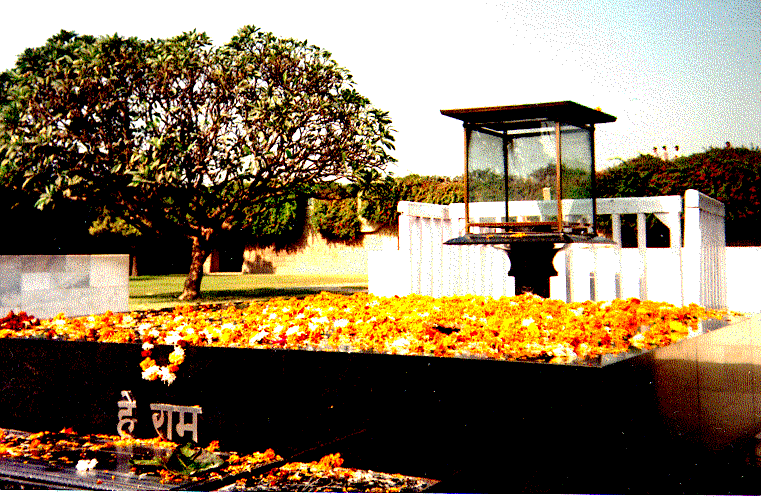
Raj Ghat in New Delhi is a national shrine: the site of Mahatma Gandhi's cremation in 1948. On the raised flower-strewn platform are Gandhi's last words: "O Rama". Being cremated at Raj Ghat is India's highest honour, like being buried at Arlington National Cemetery for an American. As does virtually every visiting head of state, President Clinton paid his respects to Gandhi at Raj Ghat during his visit to India in March 2000.
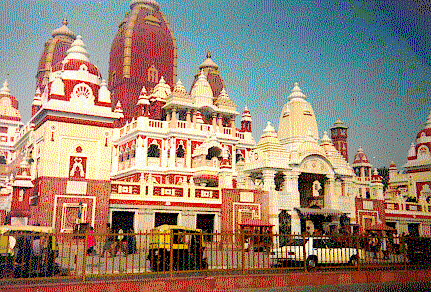
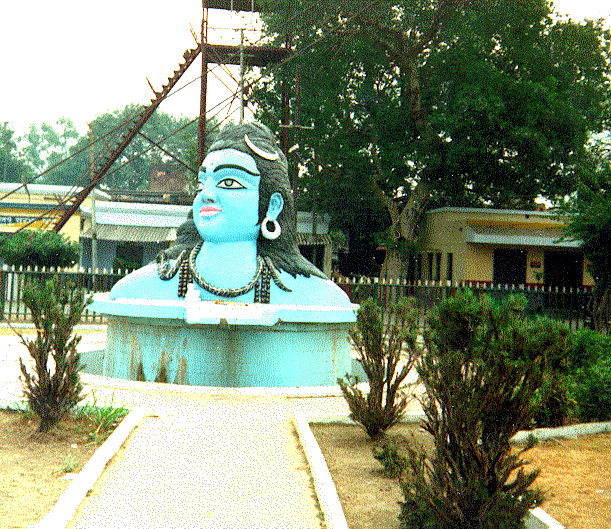
Temples, temples everywhere. New Delhi's Birla (Lakshmi Narayan) Mandir is a curious blend of Art Deco and Hindu kitsch. But even a railway station can become a place of worship. This humungous head of Shiva guards the entrace to the railway station in the holy city of Haridwar, site of the Kumbh Mela in 1998 and 2010.

Rishikesh is "yoga city" in the foothills of the Himalayas, made famous in the 1960's by the Beatles - particularly the late George Harrison - and Maharishi Mahesh Yogi. It is a great place to go "ashram crawling". Here are two of Rishikesh's ashrams and the Lakshmanjhula Bridge spanning the Ganges. The bridge is named for Lord Rama's brother Lakshman, who is said to have crossed the Ganges here. The other suspension bridge in Rishikesh is called the Ramjhula Bridge. Saying "Ramjhula Bridge" and "Lakshmanjhula Bridge" is kind of redundant, as "jhula" means bridge in Hindi.


Not all of India's temples are ancient.
This magnificent temple in Kayavarohan, Gujarat was built by the
spiritual
grandfather of Kripalu Yoga and the Kripalu
Center Swami Kripalvanand or "Bapuji"
(1913-1981), to
honour
his guru, "Dadaji" or Lord Lakulish, believed to be an incarnation of
Shiva.
This temple was dedicated in 1974, after almost 20 years of
construction.
The LIFE (Lakulish International
Fellowship's Enlightenment) Mission, based in Kayavarohan, carries
on the spiritual teachings of Swami Kripalvanand. That's me in
front
of the temple, along with some of the family who adopted me in Baroda.
If you can't find Kayavarohan on your map of India, it's about 25 km
south
of Baroda. If you can't find Baroda (Gujarat's second largest
city
and
home of the Maharaja Sayajirao
University
of Baroda), either look for "Vadodara" - another of those pesty
official
re-namings - or get a new map!
A peek inside the
Lakulish temple in Kayavarohan. Dadaji is garlanded with flowers
following the arati (offering
of light) ceremony. Sanskrit texts of Hindu scriptures, and even
pictures of Swami Kripalvanand demonstrating asanas (yoga postures) and mudras (hand movements) are carved
on the walls. Far too much Sanskrit on the walls for me to read
during my brief visit! Not visible in this photo is a Rube
Goldberg contraption that rang all the bells in the temple during the
arati.
Only a short walk
from the Dadaji temple, children play on the streets of downtown (?)
Kayavarohan. There is a post office, a State Bank of India and a
few small shops, but not much else on
Kayavarohan's main drag.
In Malav, a small town in Gujarat, close to Yogi Amrit Desai's home town of Halol, Bapuji established an ashram. After his passing, an elaborate temple (Mahasamadhi Mandir) was built in his honor next to the Kripalu Ashram in Malav. This temple was still under construction in when I visited in late 1995 but is now quite a beautiful sight, according to recent visitors. Bapuji is entombed - he was actually buried, not cremated - in a crypt below the main floor of the temple.

Here's a bumper sticker from Kayavarohan that Indians can stick on their Maruti Suzukis, Padmini Fiats, and the classic but unsafe at any speed Hindustan Ambassadors. It says "Jai Bhagwan" ("I honour the Divine in you", a greeting similar to "Namaste", heard often in Kayavarohan and at Kripalu), "Mahatirtha Kayavarohan, 391220" (the Indian zip code for Kayavarohan).

Indians love their abbreviations, and love
their
railways too. This 1929 BBCIR steam locomotive [above left]
stands
at the entrance to Bombay Central Station. BBCIR - Bombay, Baroda
and Central India Railways - was one of many railway companies merged
into
the state-owned Indian Railway system after Independence in 1947.
To many Indians, BBCIR used to stand for "Bloody Bad and Can't Improve
Railway"! The BBCIR narrow-gauge (2' 6") lines served much of
Gujarat,
including Kayavarohan. A narrow-gauge train [right] originating
at
Swami Kripalvanand's birthplace, Dabhoi, pulls into Kayavarohan
station.
A sign at Kayavarohan station says "Alight
here for the famous Lakulishji
Temple"
in Gujarati, Hindi and English. Note the red fire buckets and
hand-operated levers for use by the switchman (pointsman). Although a
few steam locomotives
were still in service in 1995 on Gujarat's narrow-gauge railways, I was
not fortunate enough to ride on a steam-hauled train.
Varanasi station. Only in India can a railway
station look like a giant Hindu temple, and you may have to dodge cows
on the platforms.
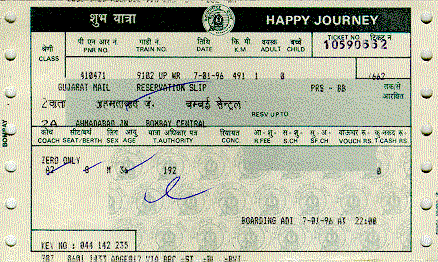
Here is a ticket to ride the Ahmedabad-Bombay
Gujarat
Mail. (The names of many of India's trains are remnants of
the
Raj.) On the reverse side of this ticket is a quote from Gandhi:
"The Allah of Islam is the same as the God of Christians and the Ishwar
of Hindus". Buying a rail ticket in India can fry the nerves of a
sadhu. It can take several hours of queueing and paperwork,
although
foreign travellers with hard currency or an IndrailPass do have an
easier
time of it. Actually this is not a ticket per se, but a reservation
slip. My IndrailPass served as a ticket.
Typical chaos at Bombay Central Station, the
origin (or terminal) for the Gujarat Mail and other trains serving
Gujarat and western India.
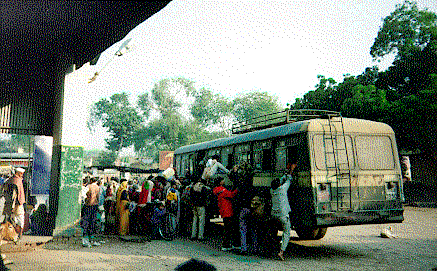
For travelling within India, the train is the only way to go. It's India for real aboard the trains, and fares are so cheap that there's no reason to be packed to the gunnels in non-air conditioned Second Class unless you're a masochist or you can't get better accommodations from the foreign tourist/VIP quota on the train you want to ride. It's also India for real aboard the buses, but not the India you would like to experience. The above chaos is typical of an Indian bus stop. Note the passengers trying to get aboard through the windows! You will even see people riding on the roof of the bus!
OK, so I lied in the introduction. I've got
one photo of the Taj. Me on the grounds of the Taj Mahal. The best I
could do photo-wise in those pre-digital camera days.
 Here's a bottle cap from my favourite brand of Indian
beer, Guru Beer.
I know at least one guru (or ex-guru) who might have sucked back a few
of these!
Here's a bottle cap from my favourite brand of Indian
beer, Guru Beer.
I know at least one guru (or ex-guru) who might have sucked back a few
of these!
India links:
Don't leave home without visiting Lonely Planet or Lonely Planet's online guide to India
Indolink - News, sports, Bollywood music, and just about anything else you want to know about India.
Delhi City Guide - India's capital, the gateway to India for many travellers, and the site of the 2010 Commonwealth Games.
Visit Mumbainet for all you need to know before you visit Bombay (now officially re-named "Mumbai").
BEST (Brihanmumbai Electric Supply & Transport) is Bombay's public transit service and electric utility all in one.
Shalom Bombay - discover Bombay's Jewish community and some of India's few remaining synagogues.
Take a virtual tour of Vaishno Devi, a Divine Mother shrine in India's far northern state of Jammu & Kashmir.
Travel information for India from Canada's Department of Foreign Affairs and International Trade.
Maps of India - download maps of India's States, Union Territories, railway network, pilgrimage sites, etc. A service of Infobase Private Ltd. of New Delhi.
Cricket - India's national sport.
The Times of India, The Hindu - two of India's best English-language newspapers.
Samachar -
your personalized Indian newspaper. Links to much of India's
English-language
print media.
Hindustan
Ambassador - the classic Indian car since 1948.
India Image - a gateway for Indian government sites.
Indian stamps - explore India through an online stamp collection.
Indian Railways Homepage (Unofficial) - includes timetables, maps and lots of links for rail buffs.
Indian
Railways official web site
Indian
Railway Catering and Tourism Corporation - online Indian Railways
ticket
reservations. Caution: online booking of train tickets may be a
hit-or-miss affair!
Raildwar, the Indian Railways portal ("Dwar" means portal or gateway in Hindi).
The humungous Indian Railways network is made up of several regional divisions:
Central Railways, based in Bombay, serves the states of Maharashtra, Madhya Pradesh, Uttar Pradesh, Rajasthan, Haryana and Karnataka. The system is a direct descendant of India's first railway line, 34 km between Bombay and Thane, inaugurated in 1853.Calcutta's Metro Railway was India's only subway system, until the first phase of the Delhi Metro Rail Corporation opened in December 2002 to serve India's capital.Northern Railway, headquartered in New Delhi, serves the states of Punjab, Haryana, Himachal Pradesh, Rajasthan, Jammu & Kashmir, Uttar Pradesh and Uttaranchal.
Konkan Railway links India's west coast, from Bombay to the former Portuguese colony of Goa.
North Eastern Railway serves Uttar Pradesh and Bihar, from the Ganges to the Nepal border.
Eastern Railway, based in Calcutta, serves the state of West Bengal, and portions of Bihar, U.P., and Madhya Pradesh.
Western Railway, the successor to the former BBCIR, links Bombay with Gujarat and Rajasthan.
West Central Railway, based in Jabalpur, Madhya Pradesh, also serves parts of Rajasthan.
South Central Railway serves Goa, Andhra Pradesh, and parts of Karnataka, Maharashtra and Madhya Pradesh.
Southern Railway, based in Madras (now officially re-named "Chennai"), serves India's four southern states: Tamil Nadu, Kerala, Karnataka and Andhra Pradesh.
South Eastern Railway, based in Calcutta (officially re-named "Kolkata" in Jan. 2001!), serves the states of West Bengal, Orissa, and Jharkhand (a new state carved out of the southern half of Bihar)..
Northeast Frontier Railway serves Assam and the other states of India's remote Northeast.
For streetcar (tram) fans, the Calcutta Tramways Company operates India's only surviving streetcar system.
Much of India's railway heritage is preserved
at the National Rail
Museum
in
New Delhi. There's also an unofficial
National Rail Museum site.
Train
travel in India - a beginner's guide by the Man in Seat 61.
Gujarat - Mahatma Gandhi's home state. No, Gujarat license plates don't say "Land of Gandhi"!
Kerala - Mata Amritanandamayi's home state in India's Deep South, a.k.a. "God's own country".
Uttar Pradesh (formerly United Provinces, but still using the same abbreviation: U.P.) is India's most populous state and contains many popular tourist spots, such as the Taj Mahal, and major pilgrimage destinations, such as Allahbad, Varanasi, Mathura, and Vrindavan. Two Hindu holy cities that I visited, Haridwar and Rishikesh, used to be in U.P. but are now part of the new state of Uttaranchal.
Air India is
India's international carrier, while Indian
Airlines is India's national domestic
airline, now facing stiff competition from several privately-owned
carriers such as Jet Airways
and SpiceJet.
High Commission of India
- Ottawa, Canada.
High
Commission of
Canada - New Delhi.
Embassy of India - Washington, DC.
There are many dead-tree travel guides for
India:
Fodor's, Lonely Planet, the Rough Guide, etc. For anyone
contemplating
a rail journey in India, I would highly recommend visiting your local
public
library or bookstore and getting hold of:
Royston Ellis, India by Rail, 3rd
edition,
Chalfont St. Peter, UK: Bradt Publications, 1997. You can buy it
online from Amazon.com.

If you find any dead (404) links, or sites that have moved, please let me know by e-mail.
©1999-2010, Mike Brooker. Updated Oct. 11, 2010. Reproduction of this page in whole or in part without my express written consent is strictly prohibited. But in India it can be arranged with sufficient rupees for baksheesh (bribe money).